|
"It's a game, it's a thought experiment: we are in the Matrix."
 |
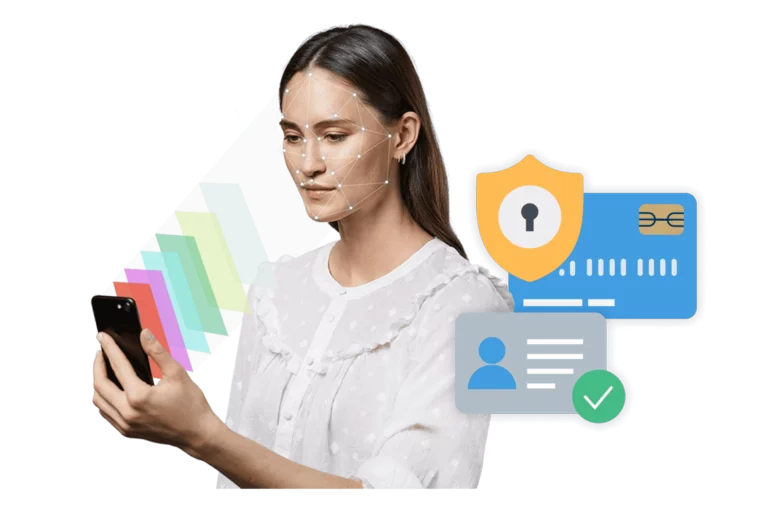
The troubling death of Erin Valenti
|
|
"It's a game, it's a thought experiment: we are in the Matrix."
 |

The troubling death of Erin Valenti
|
|
In late October 2019 - Erin Valenti, 33 years old CEO of a company in the new technology sector,
A Bright beautiful young Tech investor, was mysteriously found dead after going off grid,
supposedly having a mental breakdown which saw her referring to being in a Matrix simulation
in phone calls to her mother.
Police say she was being treated as "voluntary missing" while her friends & work collegues formed a group to try and find her.
Did she know, or find out something, |
|
|
Her last twitter post is 26th Sep 2019
song: arrest the president by Ice Cube
Arrest the President? #impeachTrump? - She's sure not a shy lady.
The East Bay Times report of Valenti going missing
Her mother, Whitey Valenti, told the East Bay Times:
"We talked to her for hours on and off" on Monday night.
"Her thoughts were disconnected. She talked a mile a minute.
She'd say I'm coming home for Thanksgiving, then in the next
she was saying she's in the Matrix,"
Miss Valenti went missing Monday night (30th Sep)
Her Husband - had posted to a Facebook group called
"Help Find Erin Valenti" at midnight on Friday, (4th Oct)
so the the report states the search was ended
3 day missing person of concern
Does it not seem odd that the police would call her voluntary missing
at the request of the family, a San Jose police officer
had contacted Valenti by phone Monday night.
in this report from the East Bay Times:
"The officer said she wasn't making any sense.
They drove around looking for her on Monday night and never found her,"
This report from Salt Lake tribune on the Friday states:
Sgt. Enrique Garcia said in an email to the Salt Lake Tribune -
"treating the case as a voluntary missing person,"
the following Oct. 14 report captures the frustration and anger
The San Jose Police Department reported finding a body inside a vehicle parked on the 6500 block of Bose Lane, only a half-mile from Valenti's last known location, near Almaden Expressway and Camden Avenue. Records show that the San Jose Fire Department responded to a medical call at 3:56 p.m. near 6582 Bose Lane.
During the phone calls with family members Monday night, Valenti said she was low on gas. With a request from the family, a San Jose police officer contacted Valenti by phone Monday night.
Joseph Valenti, Erin Valenti's father, said San Jose police did not file a missing person's report until Oct. 10. And when they did, they designated her as "voluntarily missing," meaning because she was an adult she had the right not to be found if she didn't want to be.
Friends and family members are strongly questioning that, however, given how she was acting prior to disappearing.
"Anyone that knows her knows she didn't voluntarily go missing and things could have been different," Scott Paul, a friend of Valenti, told KSL Newsradio's "Dave and Dujanovic" show Monday. "We had to self-organize, her friends in Utah had to self-organize and like, try to do a search party five days after. And it was just too late. That's not the way it should have gone."
A post on the In Memory of Erin Valenti Facebook page also raised doubt about her purposely not wanting to be found.
"I would like to emphasize how out of character this would be for Erin. While she is adventurous, she is not foolhardy and would never intentionally be out of contact with her family," the post stated hours before she was found "Erin should be considered a vulnerable person at severe risk and the police should be involved, although they have continued to treat her as a voluntary missing person."
Many expressed anger toward the San Jose Police Department on its Facebook page.
According to the
Business Insider article about Erins life
"An autopsy identified natural causes following "an acute manic episode,"
though it did not explain what killed the 33-year-old tech founder."
Erin Valenti's Biography from her Tinker memorial page
Erin Valenti had more than 15 years of multifunctional leadership experience developing and investing in innovative tech companies and running Tinker, a full service product development company.
As A Person
Erin was always energetic and full of crazy ideas. She had a very sharp intellect uncommon among others. She loved climbing rocks and climbing down the canyons.
Professional Journey
Before starting Tinker, Erin tinkered with a lot of ideas. She started working as a venture capital investor and directly led investments in the communication and fintech sectors at Summit Partners, a $20 billion fund. There, she managed a team of associates and assisted with an IPO and two M&A transactions.
After leaving Summit Partners, Erin was ready to start a venture of her own. That's when she started Skycrane, a Springboard Accelerator portfolio company and a work-for-hire marketplace. Her freshly gained entrepreneurial experience made her realize the troubles of underdog entrepreneurs and inspired her to create SLC Tech Startups, a professional networking group in Utah where she actively organized events to provide opportunities to learn, create and connect.
After her successful exit from Skycrane, Erin joined Overstock.com as the Head of Product Development, and oversaw a team of 250 engineers.
She also helped in forming the internal corporate venture capital group of Overstock (now called Medici Ventures) by leading the first five investments in blockchain companies.
Recently, she was also focused on developing training programs for software and product development and launching a web content series on innovation and creativity.
Education
Erin earned her B.S. in Business Administration from Georgetown University, summa cum laude, and majored in Finance and International Business.
Role At Tinker
At Tinker, Erin had a global team consisting of 120+ employees across Salt Lake City and in Lahore, Pakistan. Tinker built more than 700 products including mobile apps, SaaS apps, tech-enabled marketplaces and consumer websites while working for renowned startups and Fortune 500 companies.
Medici Ventures
Launched in 2014 by Overstock.com, Inc., Medici Ventures is a wholly owned subsidiary of the company tasked with overseeing its investments in firms advancing blockchain technology while providing guidance along the way.
Based in Utah, Medici Ventures advocates for the democratization of capital (to ensure everyone equal access to local, national and global markets), the elimination of middlemen (to make transactions cheaper and more efficient) and the "rehumanizing of commerce" (to ensure direct communication between parties)through the use of blockchain technology.
{snip}
In 2019, the firm led a $7 million Series A funding round for a blockchain-based voting platform, Voatz. The app allows users to vote in various elections using a secure device. In 2019, Medici purchased a 5.1 percent equity stake in blockchain banking startup Bankorus, a company that aims to offer a platform through which individuals and businesses can buy, sell, store and lend their digital assets securely.
In 2018, Medici partnered with the Zambian government to build a land title registry on the blockchain, called Medici Land Governance. This venture is aimed at collecting and securing property ownership information in Zambia using blockchain technology.
Medici Ventures owned: IDENTITY MIND
IdentityMind builds, validates and risk scores digital identities through eDNA technology to ensure global business safety and compliance from customer onboarding and throughout the customer lifecycle.
IdentityMind, creator of Trusted Digital Identities (TDIs), offers a SaaS platform for online risk management and compliance automation.
We help companies reduce client onboarding fraud and transaction fraud, and improve AML, sanction screening, and KYC.
IdentityMind continuously builds, validates and risk scores digital identities through eDNA technology to ensure global business safety and compliance from customer onboarding and throughout the customer lifecycle.
We securely track the entities involved in each transaction (e.g. consumers, merchants, cardholders, payment wallets, alternative payment methods) to build payment reputations, and allow companies to identify and reduce potential fraud, evaluate merchant account applications, onboard accounts, enable identity verification services, and identify potential money laundering.
https://imtconferences.com/identity-mind/
https://www.crunchbase.com/organization/medici-ventures/recent_investments
|
Acuant aquires Identity Mind
Acuant acquires IdentityMind
01 April 2020
Source: Fin Extra
Acuant, a leading global provider of identity verification solutions, today announced it has finalized the acquisition of former strategic partner IdentityMind, creator of Trusted Digital Identities.
Expanding its reach across the digital identity lifecycle, Acuant will combine its award-winning Trusted Identity Platform for identity proofing and verification with IdentityMind's top-performing Digital Identity Platform for identity creation, risk scoring, transaction monitoring and regulatory compliance (KYC and AML). This evolution creates a best-in-class Identity Platform for building, proofing, verifying and maintaining digital identities.
"Never before has identity been so critical to building and maintaining a stable and productive economy,"
said Yossi Zekri, President and CEO of Acuant. "Businesses must rely on trusted identities to successfully transact, fight fraud and stay compliant. Our Trusted Identity Platform, now with IdentityMind's orchestration layer, creates a new standard in identity verification."
For over 20 years, Acuant has led the industry in developing innovative solutions that provide fast, accurate and secure identity verification. IdentityMind pioneered the building of trusted digital identities while focusing on the critical task of solving for financial crimes, fraud, risk and compliance. The combined platform executes against one of the most difficult challenges we face within our society today: addressing if you truly are who you say you are and delivering the answer with certainty and trust.
With unmatched flexibility, third-party data and technology sources, and a single API, customers can access as much or as little as they need of the platform. The result is an advanced orchestration hub that provides the most accurate risk decisioning, allows businesses to move faster and delivers the best user experience across all channels.
"As digital transactions continue to see massive growth, understanding who's on the other end of the transaction is key to reducing fraud, managing risk and complying with regulations," said Trace Fooshee, Senior Analyst with Aite Group. "This evolution of the Acuant Trusted Identity Platform with IdentityMind positions them well in the dynamic market for identity orchestration platforms."
"Establishing trust in customers and understanding risk is a vital part of success in the digital world," said Garrett Gafke, CEO of IdentityMind. "That's why we built our platform around digital identities, creating and proofing 350+ million identities and earning 10+ patents along the way. There is more Trusted Identity innovation to come and we look forward to working with Acuant to make it happen."
Acuant now holds over 30 patents, the largest ID library and global reach encompassing every major industry. Acuant and IdentityMind have garnered dozens of coveted industry awards and hold ISO 27001, Privacy Shield, SOC 2, PCI DSS 3.2 certifications, are GDPR and CCPA compliant, and NIST and ICAO adherent
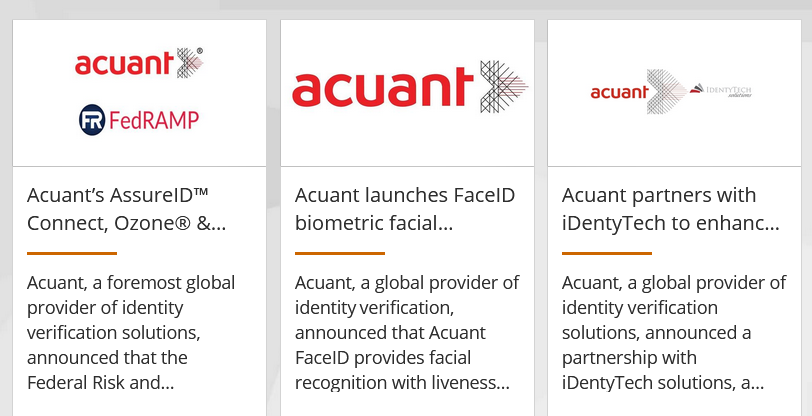
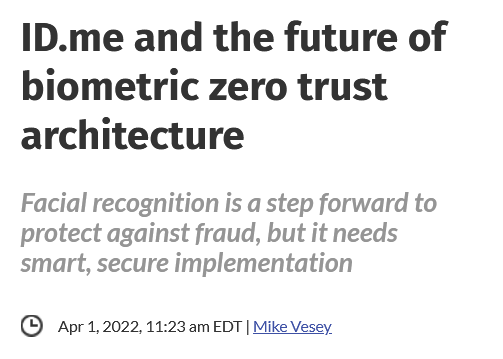
|
CEOs of biometrics providers at three different stages set the scene for 2022
Feb 5, 2022
"Consumers across Europe are increasingly comfortable with digital ID,
and also demanding of it, according to new survey results from Okta. "
Biometric Update
really?
|
ID.me = Military facial recognition app - out in the open
Military-Intell research looks eerily simlilar to Acuants e-DNA
ID.me(formerly TroopSwap and Troop ID) (military Intelligence origins, based in McLean, Virginia.)
Was contracted by numerous state unemployment
agencies to verify the identities of claimants. Formed from 2 initial Military initiatives
from Wikipedia:
In late 2014, ID.me won a contract with the General Services Administration to provide digital identity credentials with Connect.gov. Co-founder Matt Thompson left the company in 2015. In March 2017, ID.me received $19 million in its Series B funding round. In 2018, ID.me became the first digital identity provider to be certified by the Kantara Initiative at the National Institute of Standards and Technology's (NIST) IAL2 level.
(excerpts)
Verifiable digital credentials replace usernames and passwords and enable you to interact with a website through decentralized encryption keys.
They are issued through an organization's normal know your customer (KYC) or assurance processes, are unique, tamper proof, and can cryptographically prove their origin and ownership without centralized storage or sharing of personally identifying information or checking in with the source of the credential.
Although poorly executed and architected, ID.Me and the IRS were on the right path: biometrics is a great way to verify identity and provides a way to deter fraud. But the second part, the part they missed, is that biometrics only fights fraud if it is deployed in a way that preserves user privacy and doesn't itself become a new data source to steal.
Personal data fraud has become the seemingly unavoidable penalty for the convenience of digital services. According to consumer reporting agency Experian, fraud has increased 33 percent over the past two years, with fraudulent credit card applications being one of the main infractions.

DARPA - 2017 - Cyber battlefield
"The cyber battlefield is growing, it's unending and it's 24/7
& we have to keep a constant eye on it,"
"a small company may have an idea that is
exactly what DISA and the JFHQ-DODIN need."
"The new system will employ behavioral analysis and biometrics to ensure that the identity of the person using the network is verified. This probably would feature "patterns of life," in which a person's actions are compared to their established habits"
Gen. Alan R. Lynn,
DISA seeks industry cybertools
while Facial Biometrics looks set
Critics warn that, without sufficient guardrails, information collected by one agency for a seemingly benign purpose could easily be re-used in other ways.
Face recognition hackles ID.me
= ID Pattern recog
track & trace in real time
to be gaining traction:
e-DNA = Promis 2.0?
(eDNA) securely builds, analyzes and verifies digital identities,
associating an individual's known associations through public data, social network analysis, deep web, dark web and other private data sources- all in real time.
https://www.acuant.com/digital-identity-engine-risk-scoring/
Flash back to PROMIS software:
Promis = track & trace software:
"A book written in 1997 by Fabrizio Calvi and Thierry Pfister claimed that
the National Security Agency (NSA) had been "seeding computers abroad with
PROMIS-embedded SMART (Systems Management Automated Reasoning Tools) chips,
code-named Petrie, capable of covertly downloading data and transmitting it,
using electrical wiring as an antenna, to U.S. intelligence satellites" as
part of an espionage operation"
https://en.wikipedia.org/wiki/PROMIS_(software)
Excerpt from: "The Inslaw Octopus" by Richard L. Fricker WIRED
But the real power of PROMIS, according to Hamilton, is that with a staggering 570,000
lines of computer code, PROMIS can integrate innumerable databases without requiring
any reprogramming. In essence, PROMIS can turn blind data into information. And anyone
in government will tell you that information, when wielded with finesse, begets power.
Converted to use by intelligence agencies, as has been alleged in interviews by ex-CIA
and Israeli Mossad agents, PROMIS can be a powerful tracking device capable of monitoring
intelligence operations, agents and targets, instead of legal cases.
http://www.declarepeace.org.uk/captain/murder_inc/site/inslaw.html
Freelance reporter Danny Casolaro spent the last few years of his life investigating a
pattern which he called "The Octopus." According to Casolaro, Inslaw was only part
of a greater story of how intelligence agencies, the Department of Justice and even
the mob had subverted the government and its various functions for their own profit.
SMART = (Systems Management Automated Reasoning Tools)
AUTOMATED REASONING
How matrix do you want to go?
"Reasoning is the ability to make inferences, and automated reasoning is concerned
with the building of computing systems that automate this process. Although the
overall goal is to mechanize different forms of reasoning, the term has largely
been identified with valid deductive reasoning as practiced in mathematics and
formal logic."
Acuant is a provider of identity solutions for data capture, document authentication, and identity verification. Los Angeles, California, United States, North America
Categories: Biometrics, Facial Recognition, Identity Management, Information Technology, Security, Software
Founded Date: 1999
Founders: Danny Hatzav, Iuval Hatzav
Funding Status: M&A
Acuant co-founder Danny Hatzav
Relationship science
Path Finder and the other relationship mapping tools on the RelSci Platform give users the ability to run paths between any entity (person, place, list) to any other entity and get a sense of how they might be connected. There is no other functionality like it on the market.
2 other patent holders alongside Hatzav brothers
Ilan Ben-Shahar developer
Giyora Sharaby, Card Scanning solutions
Yossi Zekri, chief executive at Acuant
Profile
Profile author
also associated with
Industrial Parts Depot, Storm Industries, and Interprise Software Solutions.
It has Mossad Intelligence resonances
"Hatzav unit"
Unit 8200 - includes the cyber warfare branch Unit 8200 and the training course Havatzalot Program. Urim SIGINT Base is an Israeli intelligence-gathering installation, supposedly part of the Unit 8200.
Unit Hatzav is the open source intelligence unit within Unit 8200. It is responsible for obtaining intelligence and counterintelligence from television, radio, newspapers, and the Internet
Israeli tech start ups are HUGE: see
Acuant Onboarding
KYC Know Your Customer Fight Bad Actors, Maintain KYC Compliance, Reduce Onboarding Fraud
Transforming the Player Experience | Rapid, Secure Digital Onboarding & More
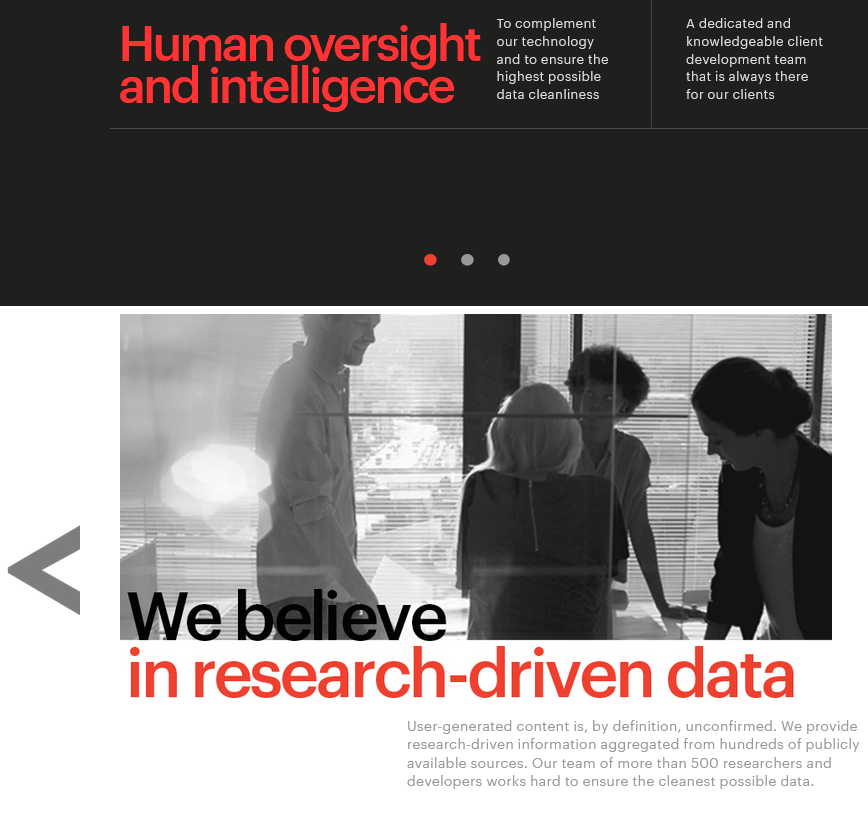
GB Group Acquires Acuant for $736 Million
That's no small deal
GB group is overseeing:
"continued expansion globally with a more immediate focus on the
Lab business report on aquisistion
From the crunchbase profile of GbGroup
We offer a series of solutions that help organisations quickly validate and verify the identity and location of their customers.
Our products are built on an unparalleled breadth of data obtained from over 200 global partners. Our innovative technology leads the world in location
intelligence, detects fraud and enables us to verify the identity of 4.4 billion people globally.
Europe, Middle East and Africa and Asia-Pacific markets."
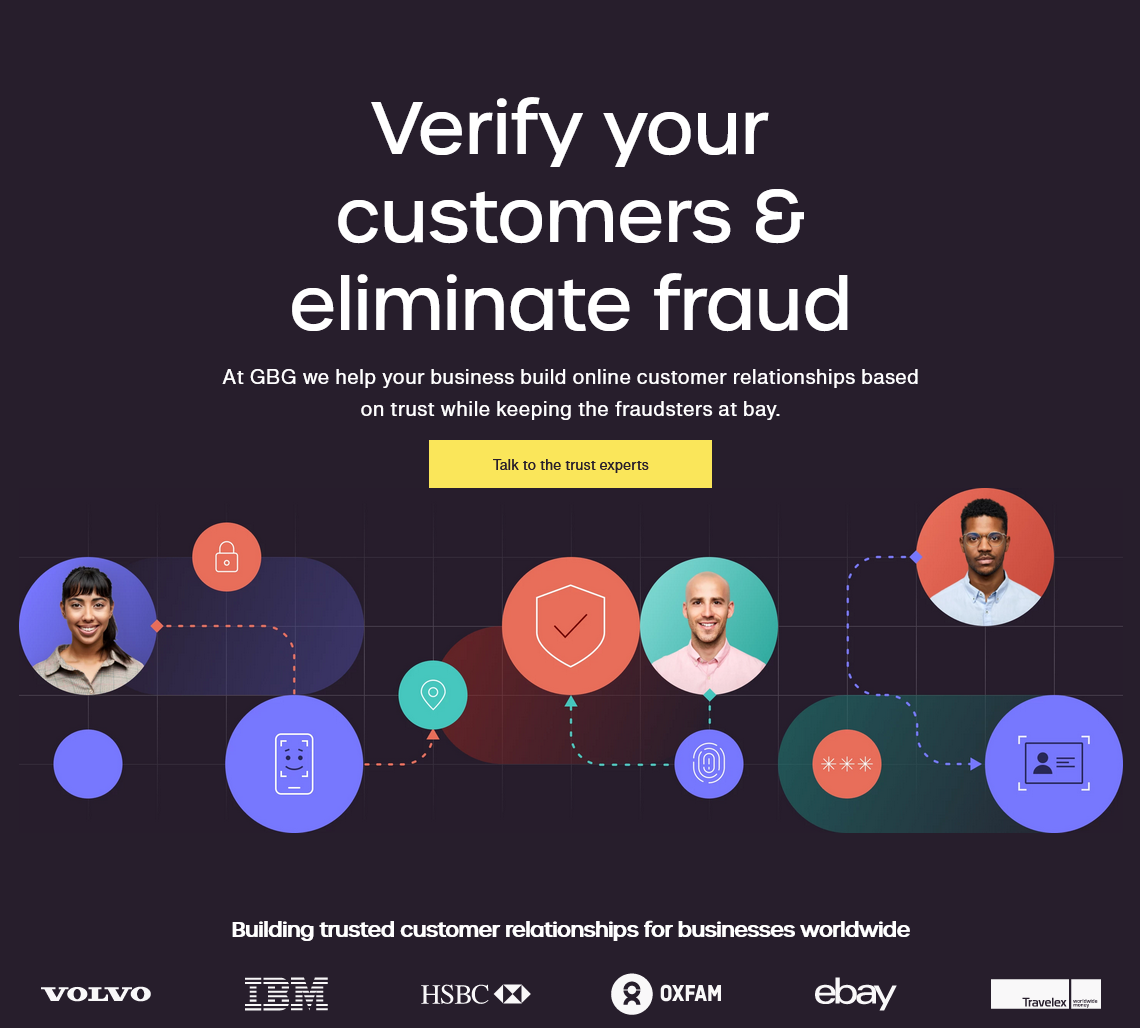
We are GBG, global specialists in identity data intelligence.
4.4 billion people globally?
The insider roster for GB group on Yahoo financing reveals this
Is called
Octopus Investments
(Investments page)
Octopus AIM VCT 2 plc financial report states:
GB Group was another detractor from performance made the strategically important acquisition of US based Acuant, adding to its ability to detect identity fraud, raising £305 million in equity
Octopus is a direct competitior with the Carlyle Group
Octopus Ventures,
part of Octopus Group and one of the largest and most active VCs in Europe, has exited its investment in Calastone, the global funds network, after a majority stake was acquired by The Carlyle Group.
Business News report
major shareholder in the company, with 13 million shares...
 Insider Ownership & Holdings - Yahoo Finance.png)
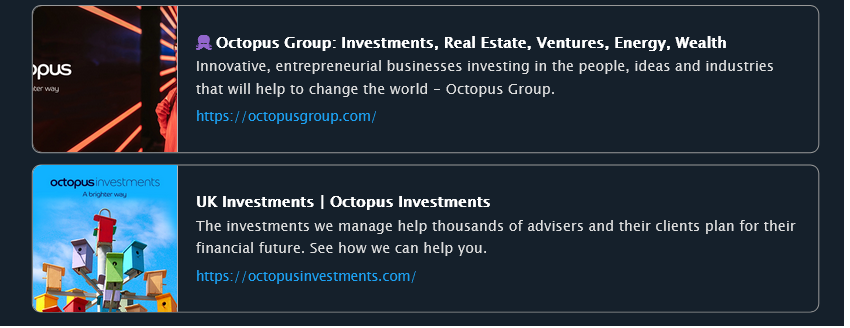
|
so, to sum up:
We have a talented tech investor die tragically saying "we are in the matrix"
Then you have one of the companys she helped form Overstock
Medici Ventures own: IDENTITY MIND
This was bought by Acuant
Acuant is aquired by GB-Group; who claim they:
"verify the digital identity of 4.4 billion people globally"
GB-Group has a top majority insider investment
Octopus investments Group - owning 13.5 million stocks
In answer to the memory of Erin Valenti, and for her surviving family;
Yes darling. We are living in a Matrix. May you rest in peace.
note:
Erin Valenti wanted to see the "rehumanizing of commerce".
I seriously doubt
that she would enjoy the global technofasism being constructed around humanity on a global level
|
coming soon: assured access
https://www.crunchbase.com/organization/medici-ventures/recent_investments
via
all encompassing
identity verification program
note Erin Valentis start up - Overstock(Medici Ventures) also used to own Evernym alongsdie IdentityMind which was bought up by Acuant, & susbsequently GB-group - while hedgefund managed by Octopus investments
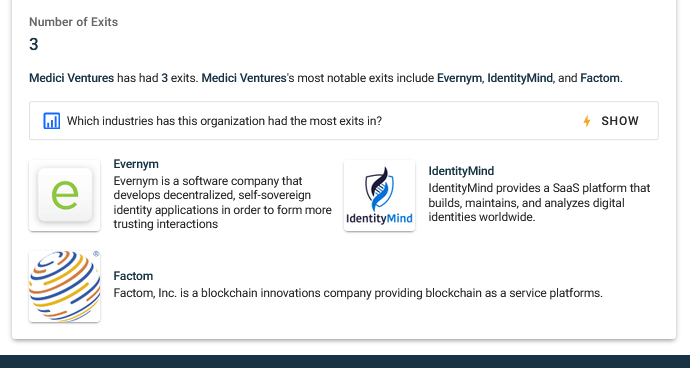
Estonia[4] has one of the most integrated national digital identification systems in the world. Citizens are able to use tokens such as their mobile device to authenticate their identity for services, like nationalized health insurance and online banking. The country also allows citizens to vote and declare taxes online. In 2017, a vulnerability in the cryptography of the Estonian digital identification system allowed for the reverse engineering of individual's private keys using intercepted public keys [5]. This lead to the compromise of about 750,000 digital identities to potential misuse. Since then, the affected ID cards were updated with new credentials. ChinaSimilar to Estonia, China also has a very integrated national digital identification system. It's system is involved in telecommunications, travel, banking, and lodging. Every citizen is required to apply for a Resident Identity Card when they are 16 years old, which is issued by the country's Public Security Bureau [6]. China is also working on implementing the national identification system on mobile phones to transition away from offline ID cards. In 2017, China updated their policy of "real-name registration", which requires the linking of users' internet accounts with their Resident Identity Cards in order to post comments online [7]. United KingdomThe United Kingdom implemented a digital identification system for citizens to access government services online in 2016, known as GOV.UK Verify [8]. It enabled citizens to receive services such as claiming tax refunds, receiving Universal Credit benefits, checking pensions, and signing mortgages. The system partners with the country's financial institutions to facilitate identity management and account creation, and citizens sign in via these "certified companies" to access the e-government portal [9]. SingaporeSingapore's national identification involves a compulsory National Registration Identity Card for citizens and permanent residents [10]. Like China and Estonia, Singaporean citizens can also use their mobile phones as a token to authenticate their identity for government services online. Currently, it operates a program called "MyInfo," which enables citizens to view the data the government has on file about income, licenses, property, and education [11]. Singapore plans to roll out a "National Digital Identity System" in 2020, which aims to "provide users CanadaLastly, the digital identity of citizens in Canada is currently distributed across several systems. For example, on the federal level, residents are able to view personal income tax and benefit information through the Canadian Revenue Agency's MyAccount portal [13], and can login to a provincial identity system to manage their driver's license [14]. There have been proposals within the country for the additional development of a Canadian national digital identity by groups such as the Canadian Bankers' Association [15]. |
.png)
|
UK and World Economic Forum to lead regulation revolution to foster industries of the future
Blockchain UK - Distributed ledgers changing the way government does business
|
|
In the fall of 2020, A DIACC Special Interest Group (SIG) was created to address the following question, "Do we need a made-for-Canada biometrics standard or Pan-Canadian Trust Framework (PCTF) component or does an existing national, international, or industry standard meet our needs?" |
|
PR for SecureKey's http://Verified.Me service
"so you can quickly get access to the services and products"
|
|
Interac Corp. acquires exclusive rights to SecureKey digital ID services for Canada
"Helping you get more out of life."
Whether buying your morning coffee, paying back a friend or evolving your business payment system, Interac helps you stay in control of your money so you can get the most out of life.
Interac homepage
Interac e-Transfer® for Business
Discover a new, convenient, fast and secure way to send and receive money, from one bank account to another—directly and instantly.
Interac e-Transfer for Business provides a fast, efficient and ubiquitous payment solution for Canadian businesses to send and receive funds. Built on the widespread adoption of Interac e-Transfer and enhanced in ways that optimize it for business use, funds are transferred using established and secure banking procedures.
|
Canada:
(digital) money management & control


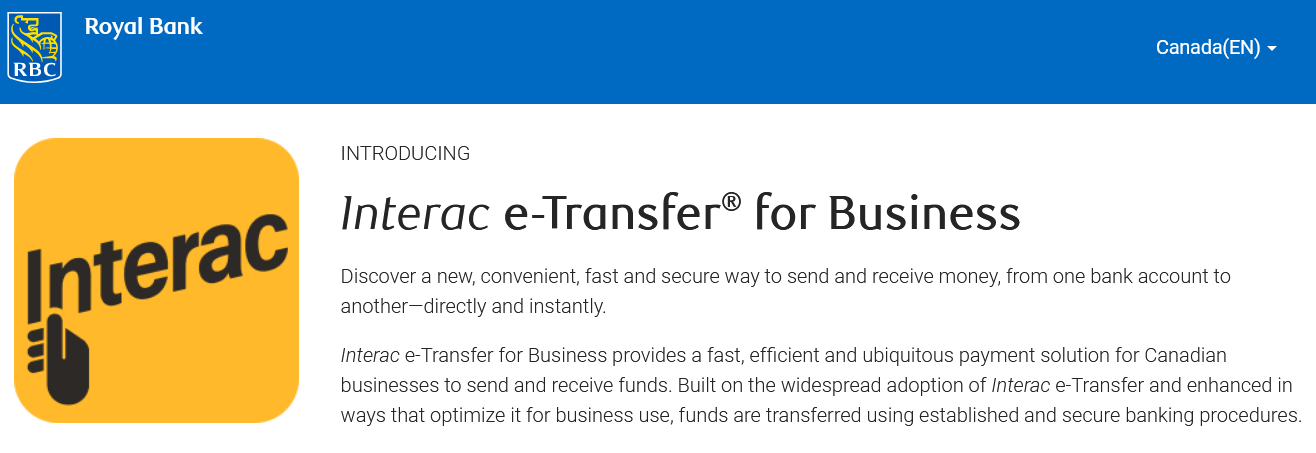
|
|
The network was launched in 1984 through the nonprofit Interac Association, a cooperative venture between five financial institutions: RBC, CIBC, Scotiabank, TD, and Desjardins; by 2010, there were over 80 member organizations. The group founded a for-profit counterpart organization, Acxsys, in 1996, which launched additional Interac-branded services including e-transfers. Following several aborted merger attempts which were either blocked by the Competition Bureau or by some of the co-owners between 2008 and 2013, Interac and Acxsys were combined into a single for-profit organization, Interac Corporation, on 1 February 2018.[1][2] Interac's head office is located at Royal Bank Plaza in Toronto.
Interac Online is an Online Banking ePayments service very similar to iDEAL in the Netherlands, Giropay[7] in Germany, and Secure Vault Payments[8] in the United States.
|
|
Canada: Covid is a scam to introduce global technocratic control
|
Canada School of Public Service Panel Proposes Digital IDs Tied to Vaccine Passports
March 26, 2022
A federal panel in Canada discussed the possibility of using digital IDs to track vaccination status. The panel also discussed making Canada a global leader in digital identification.
The Canada School of Public Service (CSPS) held an event on February 1st to discuss how digital IDs could be used to track vaccination status in future pandemics. The event, titled "The New Economy Series: Digital Identity as a New Policy Frontier, was moderated by the Senior Assistant Deputy Minister for Innovation, Science and Economic Development, Francis Bilodeau.
Bilodeau asked the panelists, "How could digital identity and a proper digital infrastructure help us deal with future situations or future pandemics?"
Joni Brennan, the President of the Digital ID and Authentication Council of Canada replied: "I think that the identity is important for the pandemic – any time you would need to verify someone, anytime you would need to also do supply chain tracking and management about how do we even get the vaccine to people? How many people do we need to get it to? Have they had it yet or not? Are they due for their second dose?"
Brennan added that the scope of digital IDs should be expanded to include vaccination status.
"In terms of making this more real, perhaps, for some of the folks inside of government, I would say that we really need to close the chasm of what identity is and what identity does. When we’re talking about identifying someone in order to get them the vaccine and do that tracking that needs to be done to deliver the vaccine and know where and how to distribute it, that’s an identity issue. Knowing that the vaccine actually came from the company, that’s an identity issue."
The discussion also touched on making Canada a global leader in digital identification.
"I think the time is perfect for us to do that, but it actually needs some teeth," said the Chief Officer for Innovation Labs and New Ventures at Interac, Debbie Gamble. "It needs political will to pull the various players across the public and private sectors together. And together, I am confident that over a number of years we can actually start to become leaders in the marketplace."
The Canadian Bankers Association is also pushing for the setting up of a federal digital identification system.
|
|
Australian report will use interoperability from EU
Australian DGX report;
"An initial common set of interoperability principles were defined to describe the context in which mutually recognised digital identities can be designed/implemented adapted via the European Union Interoperability Framework"
|
GLOBAL STANDARD
FOR DIGITAL ID SYSTEMS?
"A common set of definitions and universal taxonomy for digital identity is critical to enable mutual recognition of digital identities and interoperability of digital identity systems... This set of common definitions will evolve as trust frameworks and digital identities are further developed,"
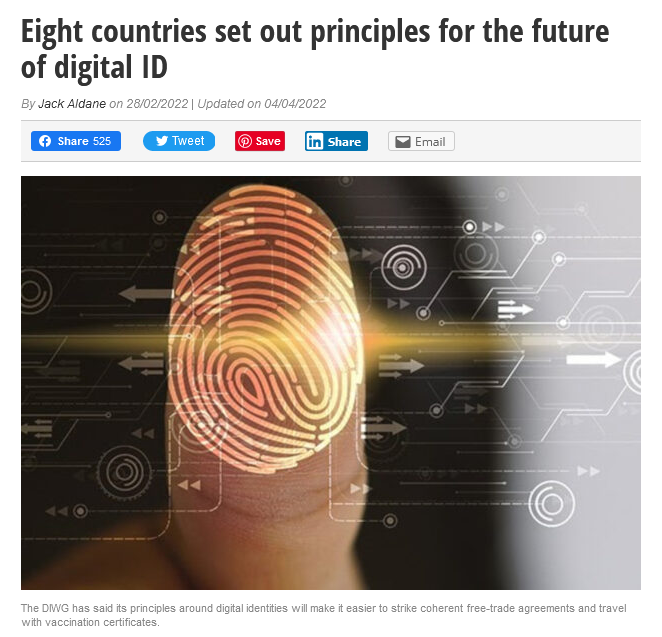
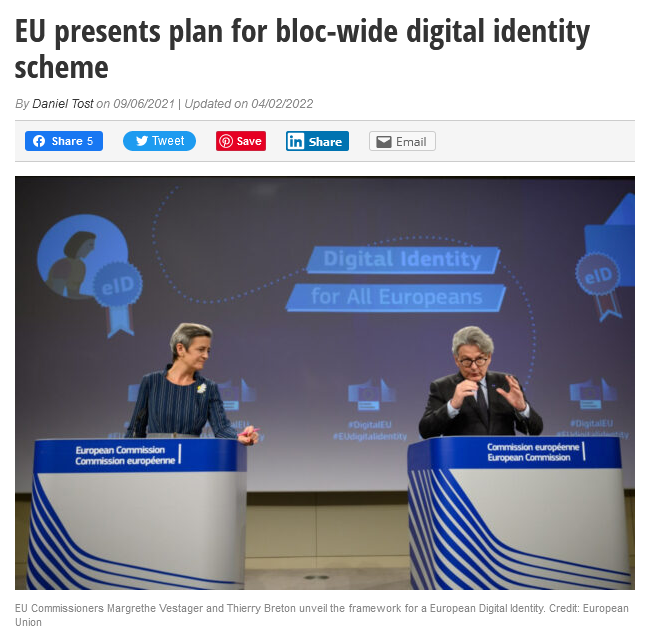
" It's about giving choice to the consumers" |
From Feb 2021 -
The European Commission revealed its plans for a digital identity framework for citizens, residents and businesses last week.
The European Digital Identity Wallet is an app that EU citizens will be able to install on their smartphone to prove their identity, access services online, share digital documents, or show other details such as age, a medical certificate, prescriptions, driving licences or professional qualifications. A unique life-long number will be assigned to every EU citizen.
Access to the app will be secured using biometric data such as fingerprints or iris scans, according to plans. The new service is conceived as an alternative to log-in services provided by companies such as Amazon, Facebook or Google.
EU citizens will be able to voluntarily sign up for the EU digital identity, which the Commission says is "secure and transparent", giving people the ability to decide if their data is stored, who it’s shared with, and how much information is available for sharing.
"EU citizens not only expect a high level of security but also convenience whether they are dealing with national administrations, such as to submit a tax return, or to enroll at a European university where they need official identification," said Thierry Breton, internal market commissioner at the European Commission.
"The European Digital Identity wallets offer a new possibility for them to store and use data for all sorts of services, from checking in at the airport to renting a car," he added. "It is about giving a choice to consumers, a European choice. Our European companies, large and small, will also benefit from this digital identity, they will be able to offer a wide range of new services since the proposal offers a solution for secure and trusted identification services."
Cross-border digital identities
|
|
The COVID-19 pandemic significantly accelerated the shift to online services and so the need to address such limitations has become more urgent.
This is being felt across the world. For example, Canada recently launched the latest iteration of its digital strategy, which includes a continued effort to introduce secure digital identities for citizens.
Some EU countries already offer identification systems to their citizens, but not all of these can be used across borders. There are 19 digital identification schemes currently in use by 14 member states, covering almost 60% of the EU-27’s population, the report says. But, as the Commission acknowledged, take-up is low, use is cumbersome and business cases are limited.
The Commission’s proposal is the result of an EU audit of existing digital ID methods. The proposed wallets may be provided by public authorities or by private entities, as long as they are recognised by a member state, the Commission says.
Preparations under way
Member states have also been invited to establish a common toolbox by September 2022 and to start necessary preparatory work immediately. This toolbox is to include technical architecture, standards and guidelines for best practices.
The Commission says it will work with member states and the private sector on technical aspects and intends to publish the toolbox in October 2022. Once the technical framework has been agreed, it will be tested in pilot projects.
The proposal estimates the European Digital Identity will have "quantifiable benefits" of up to €9.6 billion (about £8.3bn) and generate between 5,000 and 27,000 additional jobs over the five years following implementation.
|
|
"The COVID-19 pandemic significantly accelerated the shift to online services and so the need to address such limitations has become more urgent." |
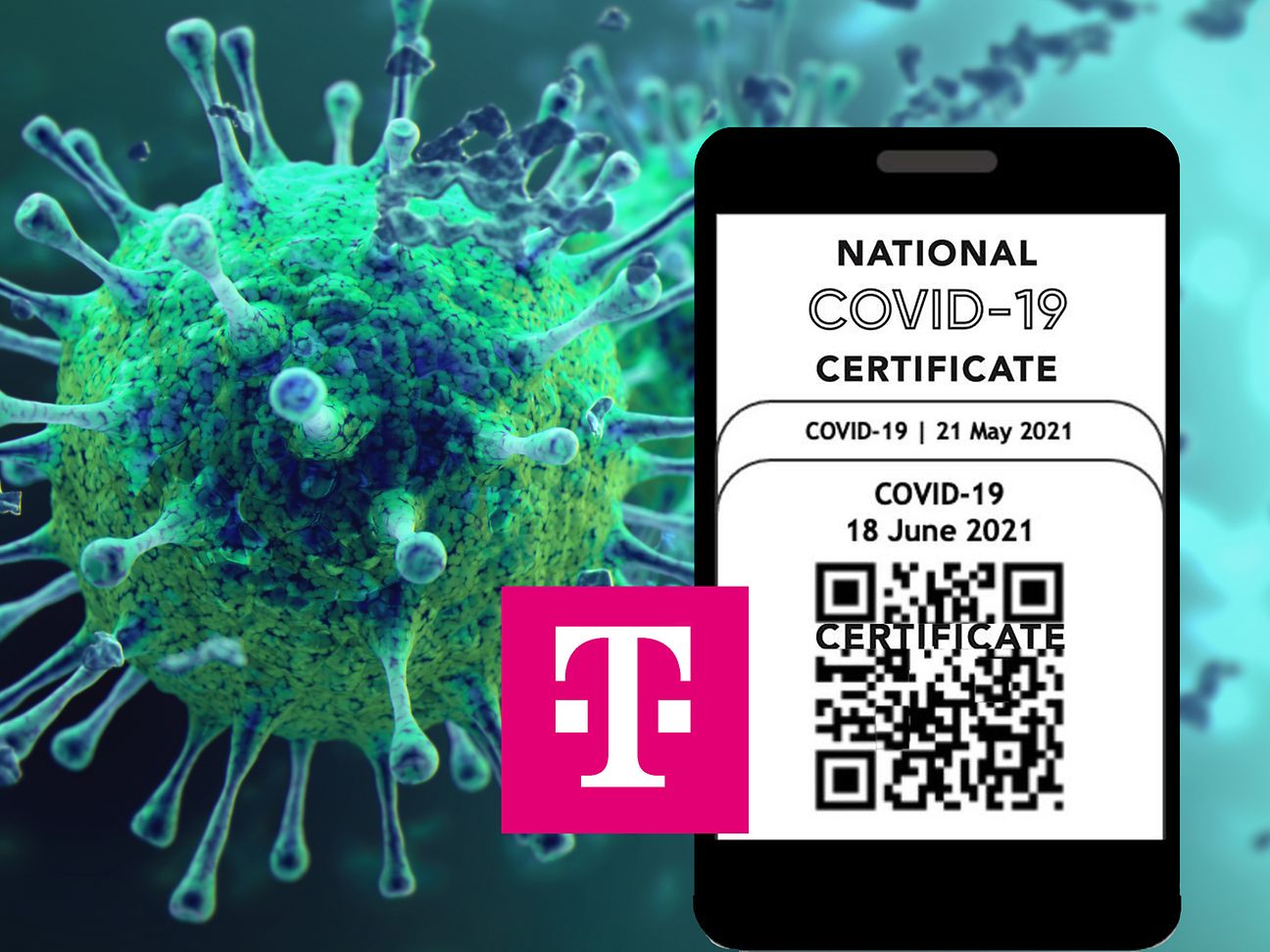 |
Checking Covid 19 certificates:
The World Health Organization (WHO) will make it easier for its member states to introduce digital vaccination certificates in the future. The WHO is setting up a gateway for this purpose. It enables QR codes on electronic vaccination certificates to be checked across national borders. It is intended to serve as a standard procedure for other vaccinations such as polio or yellow fever after COVID-19. The WHO has selected T-Systems as an industry partner to develop the vaccination validation services.
|
|
Garrett Mehl, Unit Head, WHO Department of Digital Health and Innovation, said:
"COVID-19 affects everyone. Countries will therefore only emerge from the pandemic together. Vaccination certificates that are tamper-proof and digitally verifiable build trust. WHO is therefore supporting member states in building national and regional trust networks and verification technology. The WHO's gateway service also serves as a bridge between regional systems. It can also be used as part of future vaccination campaigns and home-based records."
Adel Al-Saleh, Member of the Deutsche Telekom AG Board of Management and CEO T-Systems, explained: "Corona has a grip on the world. Digitization keeps the world running. Digital vaccination certificates like the EU's are key to this. We are pleased to be able to support the WHO in the fight against the pandemic. Health is a strategic growth area for T-Systems. Winning this contract underscores our commitment to the industry."
|
WHO's International Pandemic treaty
...the push for a global vaccine passport coincides with the WHO's drafting of a global pandemic treaty, which would legally bind member states to the WHO's International Health Regulations and allow the organization to dictate all future pandemic responses.
The WHO began drafting its treaty in December 2021 during a special session entitled "The World Together."
The treaty is to be upheld by the WHO's constitution, which under Article 19 "[provides] the World Health Assembly with the authority to adopt conventions or agreements on any matter within WHO's competence." [Emphasis added]
This authority was initially designed to pertain only to the WHO Framework Convention on Tobacco Control but is being expanded to include dictating Member States' future pandemic responses.
Additionally, as pointed out by MP Leslyn Lewis, the treaty would also allow the WHO to determine what is a pandemic and when one is occurring, even over something non-viral like an obesity crisis. This would effectively give the organization the authority to take control of member states' healthcare systems whenever they feel necessary.
"Of even more concern, if this treaty is enshrined, the WHO would be in full control over what gets called a pandemic," Lewis wrote in a statement. "They could dictate how our doctors can respond, which drugs can and can't be used, or which vaccines are approved. We would end up with a one-size-fits-all approach for the entire world... A one-size-fits-all response to a health crisis doesn't even work across Canada, let alone the entire globe."
It isn't unfathomable that a "convention" the WHO could adopt under such a treaty would be their global vaccine passport, either. In fact, this may be quintessential to ensuring compliance with whatever regulations or restrictions they impose during a pandemic that they declare.
All-in-all, far from being innocent, digital IDs in the form of vaccine passports have far-reaching, world-changing consequences and may be one of the primary means of shoehorning the world's people into a global health system run by unelected international bureaucrats.
Digital ID is the first step to instituting social credit scores
allow the organization to
dictate all future pandemic responses.
|
|
WAY WAY BACK IN TIME
BEFORE PUTIN
BECAME THE CAUSE OF
THE GLOBAL ECONOMIC DISASTER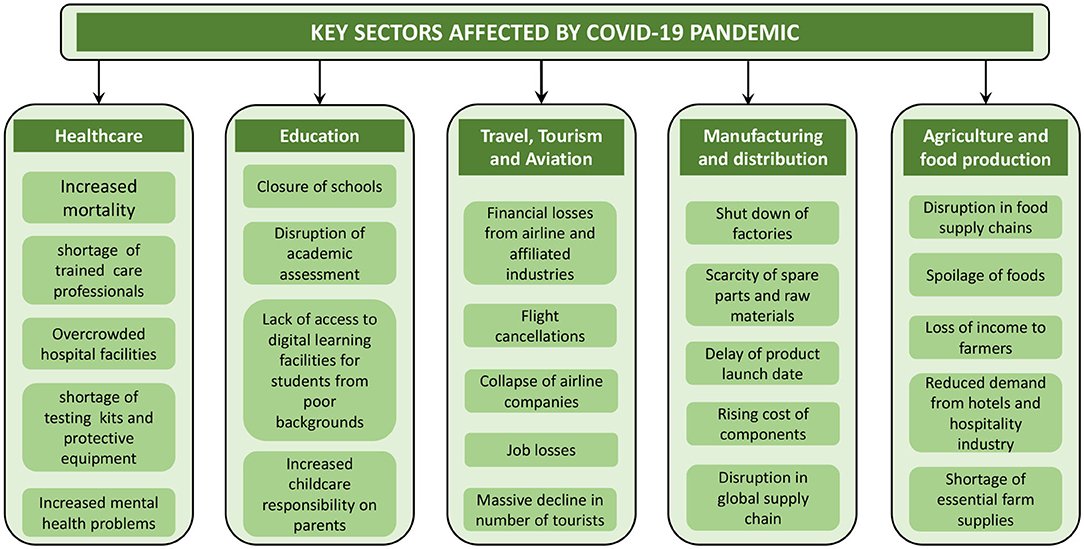
|
The Role of Artificial Intelligence Driven 5G Networks in COVID-19 Outbreak:
Opportunities, Challenges, and Future Outlook There is no doubt that the world is currently experiencing a global pandemic that is reshaping our daily lives as well as the way business activities are being conducted. With the emphasis on social distancing as an effective means of curbing the rapid spread of the infection, many individuals, institutions, and industries have had to rely on telecommunications as a means of ensuring service continuity in order to prevent complete shutdown of their operations. This has put enormous pressure on both fixed and mobile networks. Though fifth generation mobile networks (5G) is at its infancy in terms of deployment, it possesses a broad category of services including enhanced mobile broadband (eMBB), ultra-reliable low-latency communications (URLLC), and massive machine-type communications (mMTC), that can help in tackling pandemic-related challenges. Therefore, in this paper, we identify the challenges facing existing networks due to the surge in traffic demand as a result of the COVID-19 pandemic and emphasize the role of 5G empowered by artificial intelligence in tackling these problems. In addition, we also provide a brief insight on the use of artificial intelligence driven 5G networks in predicting future pandemic outbreaks, and the development a pandemic-resilient society in case of future outbreaks. |
I'll just leave this here |
Notes: further reading
Below I highlight the latest developments in the Global plan for Digital ID which tracks traces your every SocMed post, behavior, decision & geo-physical movement
I have been following & have covered the progress of Immunity / Vaccine Passports over the last 2 years
so here are some links to follow
SMART = (Systems Management Automated Reasoning Tools)
Yes all that; leads to this:
in order for you to be allowed past an authoritarian AI sentry - so you can gain access to simple goods and services.
Hey what's the big deal?
Dec 2020 - Feb 2021
The Endless Pandemic
emergency scenario
March - April 2021
SMART Phones 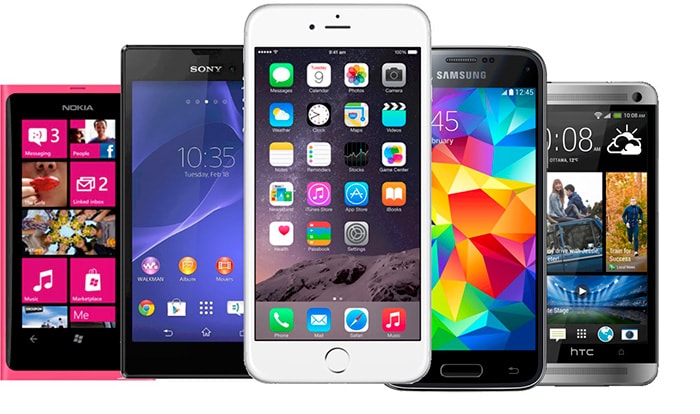
SMART Cars 
SMART Houses 
SMART Cities 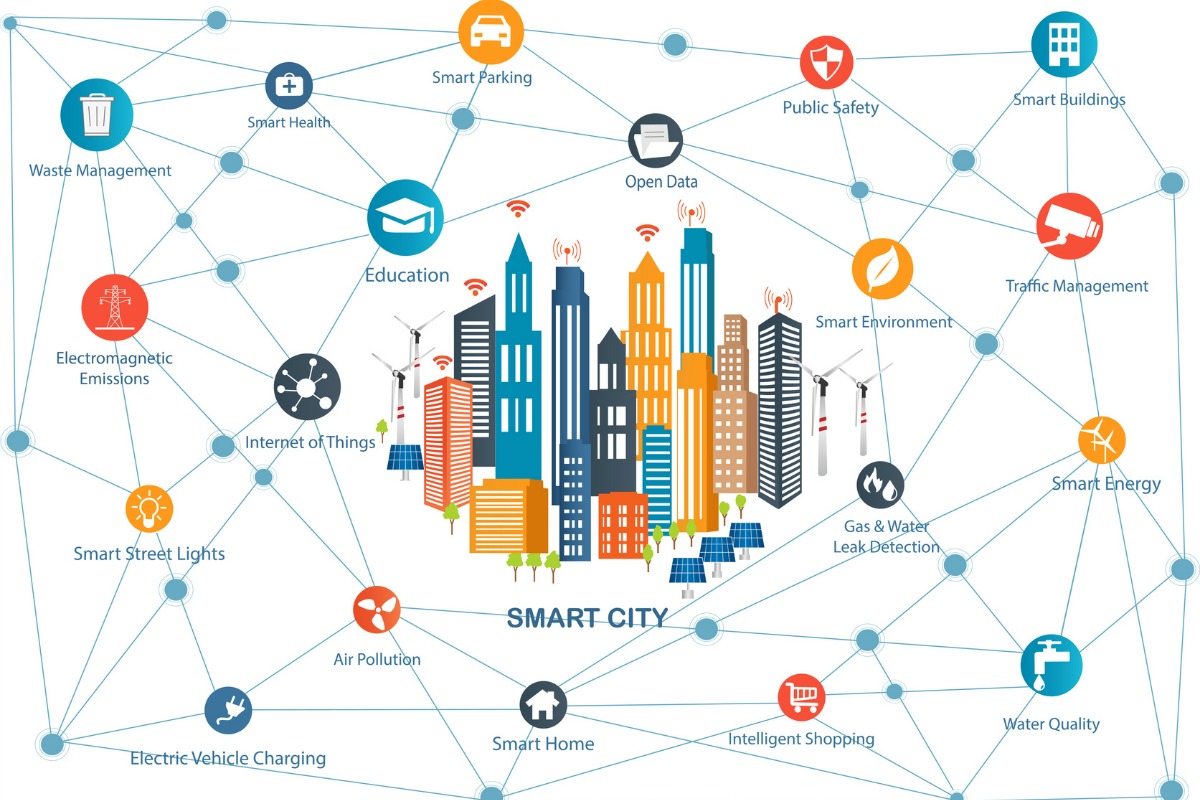
SMART HUMANS?

Be seeing you...
forget spying on you
They want to spy through you
July 2021